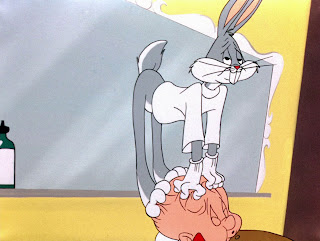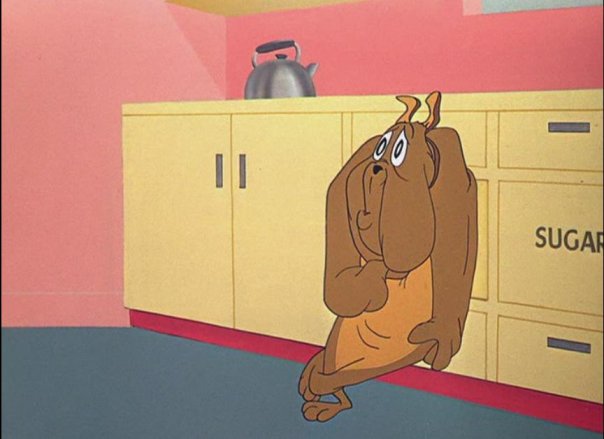The elementary school I went to had a program allowing students to eat lunch at home. So, every now and then, I would sign out at the front office and make my two blocks walk back home. Like a master of timing, my mother would have already finished cooking a nice plate of spaghetti, or some Korean dish, and before I sat down at the table, I would run over to the living room and tune the CRT television to Cartoon Network so I could watch reruns of old cartoons while eating. At which point I would rush back to the table and sit in expectancy for the meal my mother was bringing and the shows that would begin playing.
At the time, there were a slew of great cartoons that were new, for instance, Dexter’s Laboratory, Courage the Cowardly Dog, The Fairly Oddparents, Arnold, and many others. But the show that I probably watched the most during my lunchtime visits, was the Hannah-Barbera classic, Scooby Doo, Where Are You!

But it is only now that I begin to wonder why I liked it so much, the sort of questioning that is lost to a child who is just enjoying it, not dissecting it. But at the same time, I wasn’t stupid back then, I think. I knew that the story had a formula, that the monster would be unmasked after Freddie’s plan went awry thanks to Scooby and that the person would be some man or woman who appeared earlier in the episode. After a while, the show is no longer creepy, but that is okay, because I don’t think that was the point. I think Courage the Cowardly Dog was supposed to be creepy. But the adventures of the Mystery Gang were just that, adventures.
They were mysteries and as a child, I was taken along for the ride each time. I didn’t care about whether or not the monsters weren’t real. All I cared about was that I got to go to a new place, meet new characters, see a new “monster”, and most importantly experience a new adventure. That was the appeal of the series – that in its simplicities was its holistic bundle of entertainment.
So let’s talk about the Looney Tunes.
.jpg)
This was never on during my lunch trips, but whenever it was on I was watching it. I would never change the channel, even if I had seen The Rabbit of Seville 10 times already. And thank God that Cartoon Network had the colored shorts at the time. Otherwise, who knows when I would have been exposed to it? I had many Looney Tunes favorites when I was growing up: Rabbit of Seville, Duck Dodgers in the 24 1/2th Century, One Froggy Evening, Feed the Kitty, What’s Opera, Doc?, and Duck Amuck. If you haven’t seen these, please go and do so right away.
If I am going to talk about how simplicity made Scooby Doo enjoyable, then how can I skip one of the most simplistic cartoons of all time? Helmed, of course, by the genius of Chuck Jones. Simplicity and minimalism runs rampant in his work. Everything from the characters themselves to the gestures and expressions they make. Let’s take Wile E. Coyote for example; he wants to eat the Road Runner and his trust in ACME and his faith in his own plans is his undoing. Never is his suffering brought on directly due to the Road Runner. Then, there is Pepé Le Pew; a skunk that just wants love, but when he receives it, he runs from it. Of course, Bugs Bunny is perhaps the simplest in that the one rule he revolves around is that he must be provoked to get involved. I don’t think any show has been able to create such complete characters with such simple guidelines.
Daffy Duck is my favorite character. Ever since I was little, I related to him the most. Bugs was too smart, but Daffy, Daffy was human, he failed, over and over again, but at the same time, he never gave up. He wanted glory, but couldn’t have it, he wanted riches but remained poor – a duck of great ambition yet forever cursed by the animators to never see success. This was what Jones was so good at, creating honesty and thus, believability, in his characters and in his drawings.
The expressions that were featured on the characters, before they got hit by a train, before they fell 10 stories, when the realized something important, and many other poignant yet brief moments of time, are all so minimalistic. And so many of them are done with just the eyes. Even outside the realm of cartoons, how actors use their eyes in film reveals so much. When I was in Korea this summer, as I walked by my mother watching Korean Drama’s I noticed that all the actors did the same thing. They opened their eyes as wide as they could in moments of shock, sadness, horror…basically, the same expression was used for one too many emotions. But Jones had variation in his emotive arsenal. Just look at the episode called Feed the Kitty where the bulldog goes through so many expressions with its eyes.
When it gets caught putting the kitten in the flour bin, he does a “Who. Me?” look.

Then there is his worried look as he believes the kitty is in danger of being turned into a cookie…

…that is eventually followed up by his look of complete sadness, as he believes the kitty is dead.

Then there is the happiness of finding the Kitty once again.

Jones was an expert of going through various emotions in such a short amount of time. In the short I just mentioned, I went through laughter to choking up in a matter of a minute! Of course this was in part due to Jones’ masterful use of expressions, but also timing. He was easily one of the most efficient animators in terms of timing (my moms cooking wasn’t the only timely thing I would mention in this post). Especially, with gags. He played with expectancy, so that he would wait for the last possible moment before releasing the build-up in order to get to the punch line. Never did he remain too long on the build-up and never was the punch line too sudden. It was always perfect.
I am talking about these cartoons at this time because I recently finished watching Rick and Morty, which is, I think many people would agree with me, a staple in modern era cartoons, and it got me thinking about the classics and got me asking the most rudimentary question – why does this work?
Does the simplicity found in Looney Tunes and Scooby Doo work in the same manner for the successful cartoons of today? I would say yes. Let’s look at Rick as an example. Rick is a complex character with complex emotions, but that complexity sprouts from very simple human characteristics – he is sad, lonely, and his vast intellect leaves little for him to enjoy. Of course there are some characters in the show that are much simpler, like Mr. Meeseeks (he just wants to die after accomplishing his one task). The humor of the episode Meeseeks and Destroy stems from the simplicity of that character. Although the ones summoned by Beth and Summer finish their seemingly hard tasks quickly, the one summoned by Jerry cannot do the far more mundane task of taking two strokes off Jerry’s golf game – so the Meeseeks goes crazy and summons more Meeseekses (what is the plural of Meeseeks?) to help, making the situation all the more crazy. Although the show can seem, at times, to be the unrestrained and unfiltered imagination of co-creator Justin Roiland, it never fails to remember that what makes a cartoon, or any form of art, succeed, is simplicity at its core and fundamentals. But that is the trick isn’t it? Never in the history of mankind, has it been easy to create simplicity in an artistic medium.


.jpg)





